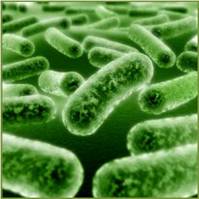How healthy are your bowels?
Does that sound silly? It shouldn't. In fact, improving and maintaining the condition of your bowels is serious business.
Chances are you have digestive issues. And you're not alone. According to recent studies conducted by the Dannon Company in 2007, nearly 90 percent of Americans deal with occasional problems with digestion.1 Seventy percent of women say digestive concerns negatively impact their lives every single day.
Digestive concerns aren't a fun topic of conversation. In fact, many people have trouble talking to their own doctor about their concerns. Others suffer in silent embarrassment, worry and discomfort over the rumbling and gurgling -- the cramps, bloating and gas. The constipation. Or diarrhea.
![]()
The fact is that if your digestive tract isn't operating efficiently, you have more to worry about than just your colon. When you carry around too few friendly bacteria and an overabundance of the bad stuff, your body doesn't make use of all the nutrients you're feeding it.
 Your healthy diet won't matter, nor will the nutritional supplements you take. If your digestive system isn't operating efficiently, you aren't getting the full benefit of your good nutritional habits. Not only is your health at risk, but you're throwing money away on high-quality food and nutritional supplements that your body can't make use of.
Your healthy diet won't matter, nor will the nutritional supplements you take. If your digestive system isn't operating efficiently, you aren't getting the full benefit of your good nutritional habits. Not only is your health at risk, but you're throwing money away on high-quality food and nutritional supplements that your body can't make use of.
The good news?
Improving the health of your digestive system is often a simple, straightforward process of achieving the right balance of good and bad gut bacteria. It's a matter of moving the right bacteria, in the right amounts, into permanent residence in your digestive tract.
There are various ways to get the job done, some of which will be discussed later on in this report.
Three very positive changes occur when your good-to-bad intestinal bacteria ratio is brought into balance:
- Your digestive symptoms diminish or disappear, leaving you comfortable and free to enjoy every day to the fullest.
- Your body begins to use all the good food and nutritional supplements you feed it.
- Your immune system de-stresses and is better equipped to fight off disease, contributing to a longer and healthier life.

A few interesting facts about intestinal bacteria:2
- Your body is home to about one hundred trillion bacteria.
- There are 500 different species of bacteria comprising that population.
- The ratio of good to bad bacteria is a critical measure in determining your overall health. The ideal balance is 85 percent good and 15 percent bad.
- One of the jobs of good bacteria is to control the growth of bad bacteria by competing for nutrition and attachment sites in your colon.
Chances are you have a good idea... a gut feeling... whether your digestive system is working properly. What you probably don't know, though, is how things got out of whack to begin with.
 If your colon has been suddenly overtaken by bad bacteria, it likely started in one of two3 ways.
If your colon has been suddenly overtaken by bad bacteria, it likely started in one of two3 ways.
- Have you taken a course of antibiotics recently?
Antibiotics kill off both bad and good bacteria. If you don't have enough good bacteria in your colon to control the growth of the bad guys, the balance will tip in favor of unfriendly bacteria.
- You've contracted disease-carrying bad guys such as the Clostridium difficile bacterium, or yeasts... or fungi. Perhaps even parasites.
But what if your digestive issues are as old as your memory or have gradually worsened over the years?
Some scientists are studying the possibility that we've taken the use of anti-bacterial products too far.4 They suspect that modern hygiene regimens result in too little exposure to helpful bacteria -- bacteria that protect us from allergies and other faulty immune responses.
Bacterial imbalance in your gut can be worsened by processed foods and foods that have been pasteurized or sterilized.
Other factors affecting your good-to-bad bacteria ratio include where you live, your age, your stress level, and any health issues you may have.
![]()
The friendly bacteria that reside in your gut have a number of very important jobs to do.5
- Digesting and absorbing certain carbohydrates.
Without good gut bacteria, your body cannot absorb certain undigested starches, fiber, and sugars. The friendly bacteria in your digestive tract convert these carbohydrates into primary sources of important energy and nutrients.
- Keeping bad bacteria under control.
Simply stated, friendly bacteria compete with the bad guys for room and board in your digestive tract. Since beneficial bacteria are more at home there, they win most of the battles for nutrition and attachment sites within your colon.
The good bacteria tell your body how much nutrition they need and your body responds by supplying just that much and no more -- so that any excess bad bacteria are starved out. The helpful bacteria also produce a substance that kills harmful microbes.
- Preventing allergies.
Friendly bacteria train your immune system to distinguish between pathogens and non-harmful antigens, and to respond appropriately. This important function prevents your immune system from overreacting to non-harmful antigens, which is the genesis of allergies.
- Providing vital support to your immune system.
Beneficial bacteria have a lifelong, powerful affect on your gut's immune system and your systemic immune system as well. The bacteria play a crucial role the development and operation of the mucosal immune system in your digestive tract. They also aid in the production of antibodies to pathogens.
![]()
About 80 percent of the cells of your immune system are located in your digestive tract. With that in mind, it's easy to see why the health of your colon dictates your overall health.
When gut bacteria is out of balance not only is your digestion and feeling of well-being compromised, so is your immune system -- and therefore your ability to defend against serious illness and disease.
 The list of conditions and diseases thought to be directly or indirectly related to a shortage of friendly gut bacteria is long and growing longer. It includes the following:
The list of conditions and diseases thought to be directly or indirectly related to a shortage of friendly gut bacteria is long and growing longer. It includes the following:
Gut-related issues:
- Infectious diarrhea
- Intestinal infection caused by the Clostridium difficile bacterium
- Irritable Bowel Syndrome (IBS)
- Inflammatory Bowel Disease (ulcerative colitis and Crohn's Disease)
- Helicobacter pylori (H. pylori) bacterial infection which causes ulcers and chronic stomach inflammation
- Leaky gut (a compromised intestinal wall that allows undigested foods and toxins to pass into the bloodstream, triggering an inappropriate immune system response)
- Lactose intolerance
Surgery-related:
- Pouchitis (a condition that sometimes results from removal of the colon)
- Post surgical infections
Infections-related:
- Stomach and respiratory infections in children in daycare settings
- Urinary and female genital tract infections
Skin-related:
- Skin infections
- Atopic dermatitis (eczema)
- Acne
- Autism
Other:
- Premenstrual syndrome
- Bladder cancer
- Diabetes
- Tooth decay and gum disease
According to Dr. Martin Blaser, a pioneer in gut microbe research, chronic inflammatory conditions -- diseases like lupus, multiple sclerosis, and rheumatoid arthritis -- are among the most challenging medical issues of our day.
Blaser, a NYU Medical Center microbiologist, believes that these diseases could be genetic or autoimmune in nature. OR... they could be a response to the gradual changes in gut flora that are the result of our modern lifestyles -- the drugs we take, the food we eat, and our growing obsession with all things anti-bacterial.
![]()
Helicobacter pylori, a strain of bacteria once present in all human guts, has mostly disappeared in the West.
The good news: H. pylori plays a major role in inflammations associated with peptic ulcers and certain stomach cancers, so it appears at first glance that eradication of this microbe is movement in the right direction. However...
The bad news: H. pylori has a benefit -- it actually reduces acid reflux. Acid reflux disease is serious in and of itself, but did you know that it's also implicated in both asthma and cancer of the esophagus?
Dr. Blaser, an expert in H. pylori, links the decline of the strain to the dramatic rise in acid reflux disease and associated conditions. Blaser also points to a connection between H. pylori depletion and obesity -- the bacteria help regulate production of hormones that act on appetite and metabolism.
The theory behind the dramatic rise in allergies and autoimmune diseases holds that we are actually suffering from a lack of bacterial exposure in our modern-day environments.
Scientists believe that early contact with microbes teaches our bodies to respond appropriately to pathogens later in life. It is a lack of exposure, according to experts, that is contributing to a rise in ineffective immune systems.
![]()
 How attached you are to speed and convenience when it comes to making food choices?
How attached you are to speed and convenience when it comes to making food choices?
Modern day convenience foods -- foods that are heavily processed and often loaded with sugar -- are essentially the equivalent of pesticides in farming.
Think about it. Pesticides are designed to quickly and conveniently kill plant bugs. What they also unavoidably kill, however, are the microorganisms in the soil, and ultimately, the soil itself.
In much the same way, processed and prepackaged foods are designed to quickly and conveniently kill your hunger or thirst, or both.
But convenience foods are often so preservative-dense and nutrient-deficient that they do more harm than good inside your body. Among other things, they promote the growth of pathogens -- bad bugs -- thereby hampering the growth of beneficial bacteria in your gut. And you know where that leads -- right?
What, exactly, are processed foods?
Simply put, they are foods altered from their natural state.6 They might be canned, frozen, or dehydrated. They frequently contain trans fats, and high levels of sodium and sugar. A few processed foods can be healthier than others -- 100 percent fruit and vegetable juices, for example. Or frozen vegetables.
Processed foods to be avoided include:
- boxed meals (macaroni and cheese, hamburger and tuna 'helpers,' etc.)
- chips and other high-calorie snack foods
- foods made with refined white flour (white breads, pastas, rice)
- frozen dinners
- high-fat canned foods (spaghetti, for example)
- packaged cakes and cookies
- processed meats (sausage, hot dogs, bologna and other packaged lunch meats)
- sodium-laden canned foods
- sugared cereals
If you're planning to wean yourself from convenience foods, start by eliminating processed meats. They're the worst of the worst and are thought to increase your risk of certain types of cancers.
![]()
Even though the average modern American ingests over a half-cup of sugar every day -- 175 pounds per year -- it may surprise you to know that sugar is not a food.7 And your body doesn't like much of it since it has trouble digesting the stuff and making use of it.
Sugar promotes the growth of disease-causing yeasts and fungi. Symptoms of a yeast (candida) overgrowth include fatigue, lethargy, depression, irritability, headaches, problems concentrating, muscle weakness, recurrent vaginal and urinary tract infections, athlete's foot, jock itch, persistent heartburn, indigestion, constipation, swollen joints, nasal congestion and sore throat.8
Like processed foods, sugar encourages your bad gut bacteria to grow, flourish, and overwhelm your digestive tract.
And that's just for starters.
Sugar in all its forms is the number one source of calories in the American diet. It is also the number one reason 66 percent of Americans are overweight, and half of that group is obese.
The list of sugar consumption-related health problems -- over and above those associated with weight gain and obesity -- is long and impressive. Conditions and diseases that affect every square inch of you, inside and out, can be directly or indirectly the result of excessive sugar intake.
From problems with your eyesight to the very structure of your DNA -- from tooth decay to fluid retention to Alzheimer's to cancer -- sugar can play a role.
 What you should avoid:
What you should avoid:
- All artificial sweeteners, such as: NutraSweet, Equal, Splenda, sucralose and others
- The obvious sweet and dessert-type stuff -- candy, gum, cookies, cakes, pies, pastries, ice cream, etc.
- Cane syrup
- Corn syrup and corn sugar
- Invert sugar
- All the -- oses, including dextrose, fructose, glucose, lactose, and maltose
In case you don't have reason enough yet to re-evaluate your sugar intake, here's another twist in the sugar-obesity connection. Researchers have discovered a difference in gut bacteria between the overweight and those of normal weight.9
In the obese, a bacterial strain known as firmicutes is found in much greater abundance than in leaner individuals. In those of normal weight, the bacteroidetes strain is in greater supply.
The firmicutes bacteria appear to be much better than the bacteroidetes strain at turning calories from complex sugars into fat. But as those who are overweight begin to slim down, the bacterial balance shifts from predominantly firmicutes to predominantly bacteroidetes.
![]()
Despite the fact that modern day lifestyles and habits have contributed to our digestive issues and related health concerns, the answer is not to turn back the clock.
There are steps you can take -- foods and supplements you can consume -- that will help to re-balance the bacteria in your digestive system and maintain it at an optimum level of health.
When your good-to-bad bacteria ratio is ideal (85 percent good to 15 percent bad), your digestive symptoms will subside. You can relax knowing that you are giving your immune system the support it needs to respond effectively to serious threats to your well-being.
![]()
In contrast to the pesticide effect of processed foods and sugar on the state of your health, fermented foods act as natural fertilizers, if you will -- providing nutrients and promoting growth of healthy bacteria in your digestive tract.
For ages, humans have used fermented foods to improve intestinal health. In fact, people of Bulgarian and Asian descent are known for their longevity -- and their consumption of fermented foods.
Traditionally fermented foods contain living micro-organisms that replenish the friendly bacteria in your digestive tract.
 A few of the foods in this group include:
A few of the foods in this group include:
- Fermented milk
- Natto
- Miso
- Kimchee
- Tempeh
- Kefir
- Yogurt
- Olives
- Sauerkraut
- Pickles
It is important to note that traditionally fermented foods are not the equivalent of the same foods, commercially processed.10 The only way to insure you're consuming the real thing is to prepare your own fermented foods at home.
Try a Kefir Cocktail
Kefir, which means ‘feel good’, is a traditionally fermented food rich in enzymes, beneficial yeast and gut-friendly bacteria. It is similar in consistency to liquid yogurt and when prepared correctly is refreshing, energizing drink.
Kefir provides all the benefits of a probiotic – and much more. It’s considered superior therapeutic nutrition, rich in many of the minerals and essential amino acids your body requires for optimum health. And Kefir not only contains strains of friendly bacteria that yogurt does not – it also helps to colonize your digestive tract.
Another benefit of Kefir is that all lactose is digested in the culturing process, making it safe for many who are lactose-intolerant. If you find that you do have trouble digesting the milk Kefir, you can substitute coconut juice.
Kefir is easy to make at home.
Combine Kefir granules with your favorite milk or coconut juice and let the mixture ferment. Both temperature and time play a role in determining the consistency and taste that is most appealing to you. Shoot for a creamy texture – a little thicker than milk. Refrigerate and drink a toast daily to your good health.
If you don’t have the time or interest in experimenting with traditionally fermented foods, don’t despair. There is an alternative.
![]()
The word probiotics means 'for life.' The dietary supplement was invented by Elie Metchnikoff, a Russian physiologist and Nobel prize winner. Metchnikoff was the first to suggest that consuming acid-producing live organisms maintained the vitality of your large intestine, leading to a longer and healthier life.12
 Like those found in traditionally fermented foods, the live micro-organisms in probiotic supplements help to replenish and maintain the friendly bacteria in your intestinal tract. Good bacteria drive down the pH of your gut, which creates an inhospitable environment for bad bacteria. The result is that the good guys flourish and the bad guys are kept in check.
Like those found in traditionally fermented foods, the live micro-organisms in probiotic supplements help to replenish and maintain the friendly bacteria in your intestinal tract. Good bacteria drive down the pH of your gut, which creates an inhospitable environment for bad bacteria. The result is that the good guys flourish and the bad guys are kept in check.
How often should you take a probiotic supplement? Taken daily, probiotics will help ease any current digestive upsets you're experiencing and will also act to maintain the bacterial balance in your gut longer term.
What you should look for in a probiotic supplement:
- No need for refrigeration
- Long shelf life
- Can survive stomach acid so that it reaches your small intestine
- Stays resident in your digestive tract long enough to be effective
![]()
There is mounting evidence that probiotic supplements can be beneficial for everyone -- from infants to the elderly -- for a wide range of symptoms, conditions and diseases.
Infants and children
Probiotics have gained recognition as an effective treatment for diarrhea in children. They have also been used in newborns and infants to repair and support the reliability of their developing digestive systems.
What you might not know is that a number of studies are planned or underway to test the benefit of probiotics in treating a wide variety of other conditions and childhood health issues:

- Probiotics are being considered in the treatment of children with HIV/AIDS.13
- A study is currently underway to see if probiotic supplements can prevent asthma in children.14
- Still another study was conducted to gauge the impact of probiotic supplementation on the oral health of children.15
- A European study reported good results in achieving relief of colic in infants.16
- There is evidence that probiotics can prevent eczema in infants.17
- The beneficial effects of probiotics on GI symptoms related to autism have also been studied.18
Women We've already discussed the benefits probiotics can provide to the vast majority of women who suffer from digestive distress. However, there are a number of other health issues specific to women that may also be positively impacted by probiotic supplementation. Among them:
- Urogenital infections19
- Immune system support during pregnancy and breastfeeding20
Aging Boomers and the elderly
Around age 60, there is a significant drop in the number of bacteria in our guts.21
People over 60 have 1,000 times less friendly bacteria than younger adults. The drop in helpful bacteria increases susceptibility to bowel disorders and infections. Infections may necessitate treatment by antibiotics, which further decimate the good bug count... and you see where this can head.
Clearly, a daily probiotic supplement is an excellent way for older adults to replenish and maintain friendly intestinal bacteria.
Also as you age, your cellular immunity declines.22 (These are the white cells that are absolutely critical to your ability to fight infection and life-threatening diseases such as cancer.)
A nine-week New Zealand study of seniors 63 to 84 indicated that consumption of the probiotic strain known as Bifidobacterium lactisresults in increases in both the number and disease-fighting capacity of white cells. And in fact, the greatest improvement was seen in seniors with the worst immune system responses prior to the study.
![]()
Dr. Joseph E. Pizzorno, Jr., physician and former member of the White House Commission on Complementary and Alternative Medicine Policy, uses probiotics to treat irritable bowel syndrome, acne, eczema -- even PMS.
Says Pizzorno, "It's unusual for me to see a patient with a chronic disease that doesn't respond to probiotics."
Two things are clear:
- Sufficient amounts of friendly bacteria are fundamental to your good health. It's impossible to be optimally healthy if your gut's bacterial balance is out of whack.
- Your lifestyle -- your diet, medications, the antibacterial cleansers you use, and other factors outside your control -- are working together to compromise the number of lifesaving friendly bacteria in your digestive system.
Maintaining a good balance of gut bacteria through diet and regular probiotic supplementation is one of the most important things you can do to increase your chances of remaining healthy and vital for a lifetime.
Source: Dr. Mercola
Posted: TrueHealthIsTrueWealth
Checkout: Sanoviv Medical Center & TaiSlim - The Weight Is Over
No comments:
Post a Comment